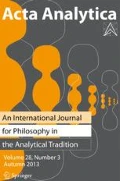Abstract
We discuss Sharon Ryan’s Deep Rationality Theory of wisdom, defended recently in her “Wisdom, Knowledge and Rationality.” We argue that (a) Ryan’s use of the term “rationality” needs further elaboration; (b) there is a problem with requiring that the wise person possesses justified beliefs but not necessarily knowledge; (c) the conditions of DRT are not all necessary; (d) the conditions are not sufficient. At the end of our discussion, we suggest that there may be a problem with the very assumption that an informative, non-circular set of necessary and sufficient conditions of wisdom can be given.
Similar content being viewed by others
Notes
Sharon Ryan, “Wisdom, Knowledge and Rationality,” Acta Analytica 27 (2012): 99–112.
A view typically associated with Socrates and the idea that the wise man knows he is ignorant.
By “theoretical knowledge,” here Ryan means knowledge of general truths and scientific laws. She attributes this view to Ned Markosian, defended in discussion. See Ryan, “Wisdom,”102 and ibid., footnote 4. The idea of wisdom as “practical knowledge” is attributed to Aristotle, Nozick, Kekes, and psychologists Baltes and Smith. See Robert Nozick, “What is Wisdom and Why do Philosophers Love it So.” In Robert Nozick, The Examined Life (New York: Touchstone Press, 2001), 267–278; John Kekes, “Wisdom,” American Philosophical Quarterly 20 (1983): 277–286; and Paul Baltes and Jacui Smith, “Toward a Psychology of Wisdom and its Ontogenesis.” In Robert Sternberg, Wisdom: Its Nature, Origins and Development (Cambridge, Cambridge University Press, 1992), 87–120, all referenced at Ryan, “Wisdom,”102.
The suggestion that wisdom involves the ability to apply one’s knowledge is developed in, for instance, Nick Maxwell, From Knowledge to Wisdom (Oxford: Blackwell, 1984) and Richard Garrett, “Three Definitions of Wisdom.” In Keith Lehrer et al. Knowledge, Teaching and Wisdom (Dordrecht: Kluwer Academic Publishers, 1996), 221–232, both referenced at Ryan, “Wisdom,” 103.
In a 2007 Stanford Encyclopedia entry, accessed June 15, 2012, http://plato.stanford.edu/entries/wisdom/.
Ryan, “Wisdom,” 107. Ryan attributes this objection to Matthew Robinson, a philosophy student in her 2010 Theory of Knowledge class at West Virginia University. See Ryan, ibid., footnote 9.
Ryan, “Wisdom,” 108.
Ryan, “Wisdom,” 111.
Robert Boyer, Introduction to The Ways of the Will by Leslie Farber (New York: Basic Book, 2000), xiii–xxv, xiv.
Ibid., xv.
Ibid., xvi.
Ibid.
Author information
Authors and Affiliations
Corresponding author
Rights and permissions
About this article
Cite this article
Fileva, I., Tresan, J. Wisdom Beyond Rationality: A Reply to Ryan. Acta Anal 28, 229–235 (2013). https://doi.org/10.1007/s12136-012-0171-3
Received:
Accepted:
Published:
Issue Date:
DOI: https://doi.org/10.1007/s12136-012-0171-3




